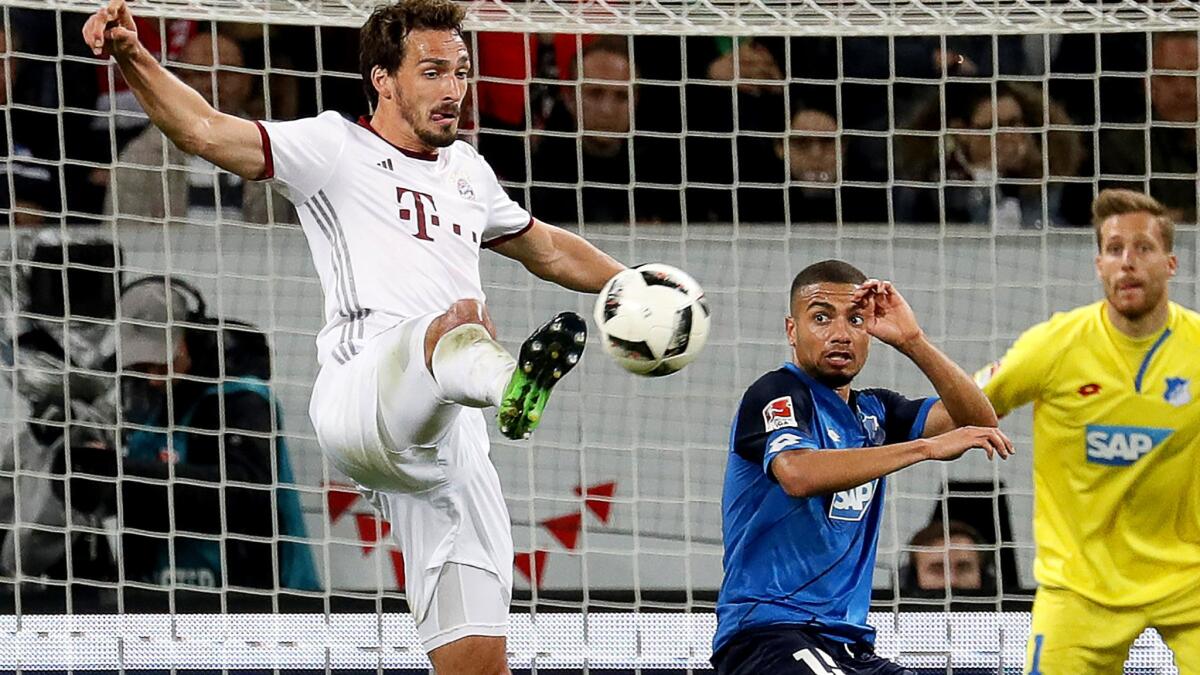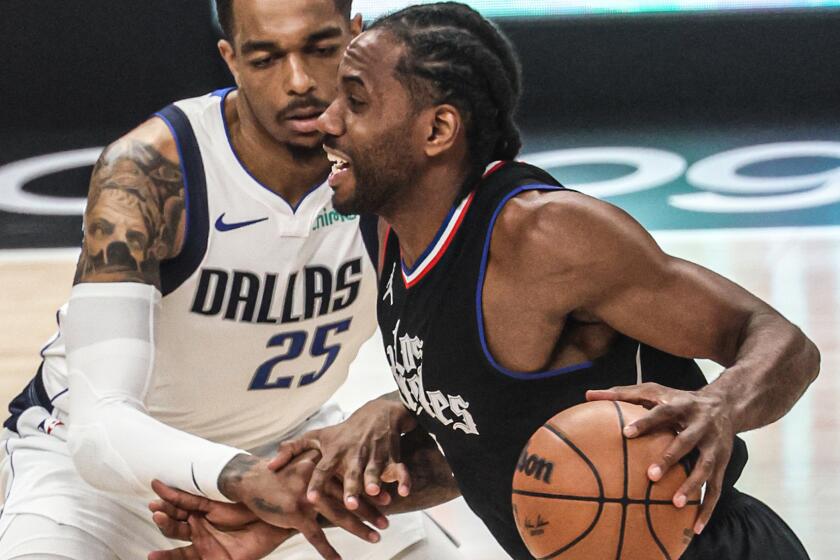Column: For Bayern Munich’s Mats Hummels, soccer success is a family affair

Mats Hummels was a key player on the 2014 team that brought Germany its first World Cup championship in a generation. And this season he’s anchored a Bayern Munich defense that has conceded a league-low 15 goals in 28 games while closing in on what is certain to be an unprecedented fifth consecutive Bundesliga title.
A berth in a second European Championship final is within reach as well.
That’s a resume few players in soccer history can challenge. But if you ask Hummels, the real sporting pioneer in his family is his mother, Ulla Holthoff, a former water polo star who became the first woman to serve as a soccer commentator on German television.
“That’s really impressive,” Hummels said. “It was tough. The men were used to working with men. I know that was sometimes really tough for her to be as strong as necessary in those situations.
“She did it.”
A love of soccer wasn’t the only thing Holthoff passed on to her oldest son. The strength, confidence and resiliency she needed to succeed in her job are traits that also proved vital for Hummels because soccer didn’t come easy for him as a boy. So, even though his father Hermann was the youth coach at Bayern Munich, Mats spent most of his time watching games from the bench.
“Nobody thought that I could become a professional,” Hummels recalled in a recent phone call from Munich. “I was not that good. It was really just one thing I had fun doing. But it was never realistic for me to become a professional until I became 17 or maybe 18.”
That’s when he was promoted to Bayern Munich’s reserve team, perhaps as a gift to his father, or perhaps as a reward for Hummels’ unwavering dedication, which frequently meant skipping family vacations to avoid missing a tournament game or practice.
However, much like his mother, all Hummels needed was an opportunity to prove the doubters wrong.
“Maybe I got a little stronger, a little faster,” he said. “Maybe I just figured it out.
“That’s why I think I made it. Because I thought about what I could do better.”
He forced his way into Borussia Dortmund’s starting lineup before he turned 20 and signed a $4.22-million contract before he turned 21.
And, before returning to Bayern Munich this season, he helped Dortmund to two Bundesliga titles, two Super Cups and a spot in the European Championship final.
The boy once thought too slow and too unskilled had grown into a man who, at 28, has suddenly become too good. But if his coaches and peers were stunned by the transformation, his parents were even more surprised.
“Never, ever in our lives did we think of one of our sons becoming a football professional,” said Holthoff, whose second son, Jonas, also played professionally. “We knew firsthand that chances are close to zero.”
Holthoff, 58, overcame long odds — and some controversy — to claim her place in the sport as well.
Although she was one of Germany’s top female water polo players, Holthoff gravitated toward soccer growing up because it was considered a “boys’ thing,” she said.
“I hated the girls’ life [and] always wanted to be a boy because boys had so much more freedom,” she said.
At 18, while working as the sports editor of a small newspaper, she met Hermann Hummels, a former player, coach and now agent, who became her teacher and later her husband.
“Thanks to him I developed insider knowledge [and] established many contracts,” Holthoff said of Hummels, from who she is separated.
That knowledge helped not only in her career, but in the careers of her sons as well because soccer was frequently the only topic of conversation in the house.
“That was a good thing because we liked it so much,” Mats said. ‘It was not a problem for me to talk about football all the time. It was … a thing we were all interested in. We really benefitted from [it].”
There were few women sportswriters in Germany in the 1980s when Holthoff got her start, but she never considered her gender an issue until she started working in television in the early 1990s.
“I saw myself confronted with more skepticism,” she said.
So when ZDF, the public broadcasting company for which she first started covering soccer, did not include her on the team for the 1994 World Cup, Holthoff jumped to a rival network, German Sports Television. There she became a pioneering programmer, establishing a Sunday morning talk show dedicated to German soccer and another program that covered leagues in the rest of Europe.
Holthoff, who has also written seven books about soccer and the Olympics, now works as an executive producer for Bavarian television in Munich.
Yet, even though Holthoff has blazed a path for other women to follow, when asked who has had the more important career — the mother or the son — she answers quickly.
“You cannot compare that,” she said. “Mats is an idol of millions worldwide. I always avoided marketing myself. I declined any offer as anchorwoman or public appearances of any kind. I wanted to lead a normal life, largely incognito.”
That’s an option she said is no longer available to Mats, which is the why the World Cup victory in Brazil brought her both joy and sadness.
“I had mixed emotions,” she said. “On one hand, total happiness … because he hit the bull-s eye [and] rewarded himself for his efforts and his passion. On the other hand, I knew that this win would change his life.
“All he ever wanted was to lead a normal life and just play football.”
Twitter: kbaxter11
More to Read
Get our high school sports newsletter
Prep Rally is devoted to the SoCal high school sports experience, bringing you scores, stories and a behind-the-scenes look at what makes prep sports so popular.
You may occasionally receive promotional content from the Los Angeles Times.







